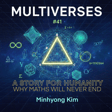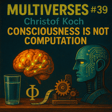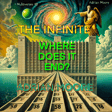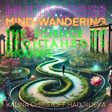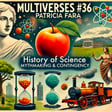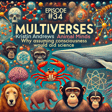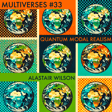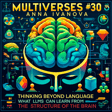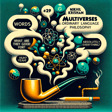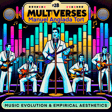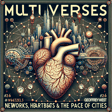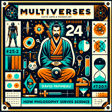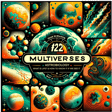Introduction to Multiverses and Scientific Theories
00:00:00
Speaker
I'm James Robinson and this is Multiverses. Science is populated with some wonderful objects, black holes, quarks, wave functions, and even the humble electron is so far beyond that everyday experience that we can't straightforwardly see it.
00:00:17
Speaker
For a long time, philosophers of science have worried that these out-there objects aren't actually out there, and that science doesn't even claim that they are. Rather, these are convenient fictions, things that help us crank through equations so we can arrive at real, tangible predictions.
Realism vs Instrumentalism in Science
00:00:33
Speaker
This is the position of the instrumentalists. And on the other hand, you have realists who say, no, if something is in my best theory of the world, then that theory is claiming that it's in the world itself.
00:00:46
Speaker
But why not ask physicists themselves? What do they believe? I guess this week is Saline Hen. She's a philosopher at the University of Bologna, she was recently at the University of Toronto, and she and her colleagues have done just that. They have fielded, I think, the most comprehensive survey of scientists' attitudes, of physicists' attitudes, to this realism-instrumentalism debate.
00:01:08
Speaker
And it's a really carefully constructed survey. They don't just ask,
Surveying Physicists' Views on Scientific Theories
00:01:13
Speaker
are you an instrumentalist or a realist? There are dozens of questions to tease out the distinct positions. Things like, are electrons real? Are electrons as real as toenails and volcanoes? And many other questions not to do with electrons.
00:01:27
Speaker
And the results are in some ways unsurprising. Most physicists are realists, spoiler, but actually in other ways they're quite intriguing. So there are a lot of physicists, it turns out, who are instrumentalists. That's a really significant subgroup. About 15% of physicists are instrumentalists.
00:01:46
Speaker
And there's many other nuances that are uncovered in the data. There's many sub-camps, distinct positions, people like perspectival realists. And the wonderful thing about this survey is that by having so many questions, they're really able to tease out the positions.
00:02:02
Speaker
So I think this is a fascinating introduction to this age-old debate of instrumentalism versus realism that offers new data and makes us ask, is it perhaps important that people have a mix of views when doing science? Or perhaps is the fact that physicists can be, you know, instrumentalists or realists, does that just show that it doesn't matter at all what perspective you have?
00:02:25
Speaker
If you want to take this survey and find out if you are an instrumentalist or a realist, you can do so. There's a link in the show notes. The link
Philosophical Diversity in Science
00:02:32
Speaker
is scientificrealism.multiverses.xyz. And with that, I hope you enjoy this discussion as much as I do.
00:02:54
Speaker
Saline Hen, thank you for joining me on multiverses. Hi, thanks. Thank you so much for inviting me. So we're going to talk about realism and specifically scientific realism and other positions that we can take towards science. So maybe we can just, yeah, set the scene. Like, what are the different ways we can think about what claims science is making?
00:03:22
Speaker
So there is maybe a simplistic way of thinking about two opposing positions on the debate about what science is about, what it is doing. So on a simplistic version of scientific realism, we're saying that science is about
00:03:39
Speaker
accurately describing the world as it really is, including the underlying order of things, so beyond what is merely observable, can we get to the deeper secrets of nature and how it works, and the claim of scientific realism is that our current
00:04:01
Speaker
science is successful in doing so so that doesn't mean that everything that science says is true or that all of our theories are completely true but they're at least at least our most successful scientific theories are approximately true so we shouldn't expect a future generation to completely discard what we are saying about the world currently
00:04:27
Speaker
And then the opposite position would be that science is not about describing the inner layers of nature. It's about constructing tools or instruments that can successfully predict and systematize observable phenomena.
00:04:53
Speaker
And what they're talking about, the kind of entities that they're talking about that are unobservable should not be interpreted as really existing out there in the world. They're just
Complexity of Realist vs Instrumentalist Debate
00:05:05
Speaker
useful ways of describing and
00:05:11
Speaker
and predicting phenomena and so we should on the contrary expect that future generations might come up with new theories that will overturn our current theories in the same way that past scientific theories that scientists used to think were true are now considered
00:05:33
Speaker
at least only partially true. And so this is a very simple way of setting the debate. Currently, of course, in philosophy of science, there is a lot of nuance, a lot of different positions that emphasize one or the other aspect or choose to add more complexity to these views. But this is the, yeah.
00:06:02
Speaker
Yeah, not surprising that once philosophers get their hands on things, they they find more complications, right? But I think that sets us up well. And I mean, it emphasizes that, you know, the
00:06:15
Speaker
anti-realist stance or the classic anti-realist stance of instrumentalism, it's not just the same as general skepticism. There's this very long history in philosophy, obviously, of doubting everything. And the instrumentalist is not in that business of saying, no, maybe I don't exist. Maybe this table isn't here, et cetera. They're in the business of saying, look, science
00:06:43
Speaker
coarse-like claims that it's making about what the planets are doing and things like that and how a projectile will move. That checks out, right? I can get on board with that. But when it gets into, I don't know, how many dimensions there are and what strings are and quarks and things that are just so far from
00:07:13
Speaker
experience, I don't need to believe in that to get the benefits of science. And maybe science isn't even trying to deliver me those things, right? It's not trying to claim this stuff is really real. It's the kind of classic phrasing is it's a useful fiction, I guess.
00:07:34
Speaker
So and you mentioned this kind of observable, unobservable distinction, which is always a bit of a thorny one. And maybe we can get into that in some more detail later. But I kind of want to start with this paper that you
00:07:54
Speaker
have as uh I guess it's been accepted so and it's and one can read it as a preprint and it's this wonderful survey of what it is that scientists and philosophers actually believe um and it's a really nicely designed survey because you're not just asking them oh are you a realist are you an instrumentalist which I mean many physicists probably wouldn't even
00:08:17
Speaker
you know, I think in those terms, but you've got a very concrete set of questions which tries to tease out what is the position that someone's holding. So, I mean, yeah, maybe start by like, what was the motivation for trying to find out what physicists specifically actually believe?
00:08:40
Speaker
Yeah, so I mean it started during my PhD, so this survey was done in collaboration with my colleague in Franhana Tomczyk, who was doing her PhD.
00:08:54
Speaker
with me in Philosophy of Science at the University of Cambridge. And Christoph Sperber then joined us for the statistical analysis part of the survey. But it basically started in our discussions that we had with our working group, with our supervisor. And we had a reading group on scientific realism. And so we were discussing a lot of these issues together.
00:09:20
Speaker
And Hannah herself is a practicing physicist. She has a PhD in quantum optics and atomic physics. And the question of what physicists believe actually came up quite a lot. And we were all relying on anecdotal evidence either for those who were practicing physicists talking about themselves and what they believe when they're working in lab.
00:09:47
Speaker
or what their friends believe. And so we were really curious to know what would be the majority view among physicists, what would be the majority view amongst experimentalists versus theoretical physicists, or whether there would be any distinctions about this. And we
Crafting and Conducting the Survey
00:10:07
Speaker
also noticed that in the literature some claims are sometimes made like
00:10:11
Speaker
It would be crazy not to believe in the existence of electrons. Obviously, all physicists believe in the existence of electrons.
00:10:20
Speaker
or physicists are not realists. When they practice their science, they don't think in those terms, they don't think about these issues. So we were just curious to have a broader picture and a little bit more accurate picture based on a bigger sample size, basically.
00:10:46
Speaker
It's lovely to see philosophers kind of getting out of the armchairs and trying to get some data on the world. So yeah, and yeah, as I said, I really like the questions that you ask. So yeah, maybe take us a little bit through the kind of the design of this survey and how many respondents and things like that you got and where you found them.
00:11:13
Speaker
I don't know, any things that you think are kind of interesting to help understand how this works? Yeah, so first, I mean, I can say a few words about how the questionnaire was designed because it was very difficult to design a questionnaire that can get both at the nuance of the views and can be clear enough for non-philosophers
00:11:40
Speaker
And yet to be short enough that we get as many respondents as possible. And I remember in the early days of designing a survey, we wanted to ask so many questions. We wanted to ask what their view of truth was, whether they were
00:12:00
Speaker
thinking about these issues in the same way in the lab or outside of the lab and it was just getting too complicated. We even wanted
Analyzing Survey Responses and Patterns
00:12:08
Speaker
to do the survey with other scientists as well, so have specific sections.
00:12:13
Speaker
for biologists, neuroscientists to also compare between scientists. And then we realized that was just way too ambitious. And so we set on, I think that's, yeah, 30 questions, which is already quite a lot, but still not enough, obviously, to cover all of the complexity of these issues.
00:12:36
Speaker
So yes, we wanted to pick some statements that reflected some philosophical views, but trying to reformulate them in a way that's accessible to physicists. So about what does physics do? Does it accurately represent the world? Does it tell us about how it works? Or is it merely useful instruments that can help us manipulate and predict phenomena?
00:13:04
Speaker
Then we had specific questions about specific entities like electrons and we didn't just want to ask them whether electrons exist because as many, many respondents of the server actually commented in the comment section, all of these terms are
00:13:21
Speaker
hopelessly ambiguous and can be interpreted in so many ways. So we did try to decline this statement in several different versions to get at a bit more nuance about the claim that electrons exist. So do they exist out there independently of our models and theories, or are they postulated as real within the model or theory? Are we getting closer to the real nature of the electron?
00:13:48
Speaker
Are they as real as toenails and volcanoes? That's a quote from Ian Hacking. So we did try to do that with electron. Unfortunately, we couldn't do the same with everything because that would have made survey way too long.
00:14:04
Speaker
So yeah it was it was fun but it's very difficult to constrain ourselves and i tend to be the one that wants to add so many more things and i was like no no no wait a minute like we need to we need to make it manageable also for statistical analysis because we need to make the questions so that.
00:14:26
Speaker
they can be easily analyzed and that means that we had to make other choices like for so many of these questions for example one view I mean we try we try to force an opinion on people a little bit although we did have a slider so you could choose between zero
00:14:47
Speaker
I completely disagree or strike me as completely wrong and hundreds distracts me as completely right. But we were wondering whether we could have an option that says I suspend judgment or I have no opinion about it or this question doesn't make sense to me because obviously that can be the response as well. But we just thought
00:15:10
Speaker
there is no way of adding that option in a way that is manageable for then the statistical analysis. So yeah, there is so much more nuance that cannot be captured by this kind of survey and yet it's still really helpful to get a sense of
00:15:31
Speaker
what people think about certain issues
Clusters of Philosophical Stances in Physics
00:15:33
Speaker
based on a larger sample size. So yeah, about the sample size, we had 384 physicists and 151 philosophers of science. And then a few who were neither, but they weren't accounted for in the survey.
00:15:53
Speaker
Yeah, that's an impressive, I mean, it's wonderful that you managed to ask so many people about this. And by the way, yeah, it's so interesting that I've never considered this point that, you know, some of the
00:16:07
Speaker
It's a very philosophical take on things to say, well, actually, I neither disagree nor agree with this statement. It's just a meaningless statement from that point of view. And maybe we need more dimensions to our sliders. But yeah, just so that designs are not like that. Yeah, so I think the 30 questions that you came up with
00:16:32
Speaker
Yeah, I can see just how much curation that must have taken. And yeah, it is interesting, as you mentioned, I think five or maybe even six of those questions are about electrons. So that's like...
00:16:47
Speaker
20% or something of your study. But it makes sense because it's such a paradigmatic case in the literature. That happy example of electrons are at least as real as toenails and volcanoes. Such a poetic way almost. So visceral how he
00:17:06
Speaker
how he gets to it. But yeah, just to give a flavor of the different questions, at least on electrons, you have like the electrons exist question or statement. And then electrons without with all their properties exist out there independently from our theories. Our theories are getting closer to the real nature of the electron.
00:17:27
Speaker
And then here's one which is driving something different. Electrons are postulated. It's real within our models. It does not make sense to ask whether they exist outside or independently of those of the theory models. So clearly, that's a kind of, I guess, instrumentalist take on things. Or maybe slightly more internal realist, one might say. So you can still be a realist, but you're not buying into all the metaphysical claims that there is a kind of reality independent of
00:17:57
Speaker
descriptions of it. And then this one is very instrumentalist. There is something in the world that behaves like what we would define as an electron, I guess. So, yeah, it's really interesting to see just for this single question, you know, which one might think, oh, just electrons exist, we have to ask so many, you know,
00:18:20
Speaker
There are many questions that are needed to tease out the different positions that one can take on that, which suggests just how subtle these positions are. Yeah, and of course, I mean, I'll go over some of the other questions because I do think they're so wonderful. I think the first one is just our most successful physics shows us what the world is really like.
00:18:43
Speaker
So straightforward scientific realism one. And then there's this question of if there was a highly advanced civilization in another galaxy, there scientists would discover the existence and properties of many of the imperceptible objects of our current physics, which gets to this question of not only is science trying to deliver a picture of the world as it is, but it's actually doing a good job, which is one can have
00:19:13
Speaker
They're independent questions, I suppose. Yeah, exactly. And actually, this question we thought was important because...
00:19:24
Speaker
Sometimes we wonder what would be a practical implication of saying that our scientific theories are true, for example, and based on the different views of what truth is, you could get a very different thing. So with this kind of hypothetical scenario we wanted to get a
00:19:47
Speaker
I, we thought that was a useful way of testing whether someone is really realist. So they're not just saying scientific theories are true, which could just mean they're perfectly adequate. They're, uh, that is the successfully described observable phenomena, but, um, that the, and what the kind of entities that they described. So the quarks, the, um, the food ons and the protons they, um, another, uh,
00:20:16
Speaker
advanced civilization would discover the same object with the same properties or would carve out the world in the same way that we do, which has more of a metaphysical implication than merely saying that the scientific theory is true, because that also removes the possible contingency of our
00:20:41
Speaker
scientific practice that we just got at these kinds of theories and these kinds of entities because this is how scientific practice got organized and this is what we found useful to build in our current historically culturally situated practices, but if an advanced civilization would
00:21:08
Speaker
get at the same kind of entities that shows that the way the march of signs is not contingent, we're really getting at the joints of nature, so to speak. Yeah, I guess if one believes in like a kind of correspondence theory of truth or a representational theory of truth, there's just like one
00:21:27
Speaker
there's kind of one way that things are, and either our science is getting us to that, and therefore, you know, and we'd expect another land civilization to get to the same thing. But, you know, there are other theories of truth, as you kind of point out, and one might just have like, might claim, okay, well, you know, it's enough for our theories to be
00:21:54
Speaker
internally consistent and produce external observations that are in agreement with everything. This kind of idea, I guess, of maybe Dennett's real patterns, which some people will be familiar with, of if you have a pattern which is really useful in doing things, that is enough for me to call that pattern real. And that extends beyond science to things like, I don't know, happiness and intentional states and things like that.
00:22:25
Speaker
But that's a very different kind of idea of truth to the kind of classic, oh yeah, there's just the stuff out there and I'm trying to create a map onto that with my words.
00:22:38
Speaker
Yeah, maybe we should talk through some of the results because you suggested some of the things you're hoping to find like, is there a difference between theoreticians and experimentalists? Is there a difference between philosophers and physicists? So yeah, was there? What came out?
00:22:59
Speaker
Right, so about these questions, we were actually very surprised to find that there were no statistically significant differences between
00:23:12
Speaker
different groups of physicists. So we tested for experimental versus theoretical physicists, physicists working in basic versus applied physics, the different fields of physics broadly construed. And then, so for none of these, we found differences. We did find a difference, weak to moderate correlation between
00:23:42
Speaker
degree of scientific realism and the time spent in research. So apparently the more time you spend in research, the more likely you are to be a scientific realist. That is the only one we found. And we were really surprised because we thought that there would be some difference, at least at the level of individual statements between experimental physicists and theoretical physicists. So for example, maybe experimental
00:24:13
Speaker
physicists tend to use theories as instruments to perform experiments and interpret data, so maybe there would be more instrumentalists about theories, but then they manipulate entities, and that was one of Ian Hacking's claim, that experimentalists, as they manipulate entities, cannot but believe in the reality of these entities, and so
00:24:38
Speaker
Does that mean that experimental physicists would tend to be more realist about those entities that they manipulate? Or on the contrary, maybe theoretical physicists, because they are working maybe more, maybe because they're more removed from scientific practice and dealing with abstractions. And for example, if you deal with string theory, it's maybe you think that these kinds of theories are just
00:25:08
Speaker
speculations, they're not real descriptions of the world, or on the contrary, you think that you're really getting at the nature of the world. So we weren't sure in which direction this would go, but we did think that there would be a difference. So we were really surprised to find that there were none, including for the individual statements about entity realism.
00:25:33
Speaker
Yeah, I found that really surprising as well. And as you say, there's 30 questions here. So there's a lot of places where, even if broadly speaking, both theoreticians and experimentalists are realists, which it turns out they are on average. You might think, well, maybe they're realists about
00:25:58
Speaker
maybe the kind of realism that they have is slightly different. But yeah, across all those statements, they come in very close as groups against one another. Despite the fact that, yeah, many people would think, oh yeah, experimentalists and theoreticians are completely different breeds within physics, at least, you know, they often kind of talk themselves that way. But maybe there's a lot more.
00:26:24
Speaker
Maybe that difference is overhyped. And certainly in terms of their kind of stances on these issues, they're really surprisingly close. And that becomes perhaps more, one might think, oh, well, maybe just everyone thinks alike, right? But then when you look at the positions of philosophers, that's actually quite different. So yeah, maybe talk us through that.
00:26:54
Speaker
Well, I mean, you said, right, maybe everyone thinks alike. And actually, that's a good point. That is the opposite. It's not that both theoretical physicists and experimental physicists, they all think in broadly the same way.
00:27:08
Speaker
is that within every group, everyone disagrees. I mean, there is a lot of disagreement. So within physicists, within groups of physicists, and also, of course, between physicists and fellows of science. So one of the idea of the survey, of course, was not just to
00:27:28
Speaker
Survey physicists opinions about scientific realism but see how that compares to also the science that there had been already a study probing these questions by
00:27:43
Speaker
so they had already tested different stances within the scientific rules and debates between scientists so their surveys was much broader because it was also investigating views from different scientists including from physicists to anthropologists so very different
00:28:09
Speaker
different kinds of sciences and as compared with the view of scholars in philosophy of science or history in philosophy of science. And so they had already found that physicists or at least STEM scientists tend to be more realist than philosophy of science or science and technology studies scholars.
00:28:39
Speaker
And which is not surprising. And we did find a similar result that philosophy of science are slightly less realist than philosophy of physics, but sorry, than physicists. But the difference was not as major as we expected. It was so I have the I'm not sure if I have it here.
00:29:09
Speaker
We calculated the mean. We also calculated different ways of calculating the realism score for different people. And we had similar results based on different methods. But from what I remember, just based on the average of the responses, I think we found a difference of maybe four or five points out of 100 or maybe six. But it wasn't as major as we
00:29:38
Speaker
as we thought. But yeah,
Methodology and Challenges in Clustering
00:29:44
Speaker
but the interesting thing is also to see the difference within the groups of physicists. And actually it's funny because we already got a sense of this when we were devising the questionnaire because when we were thinking about what type of questions to ask, we wanted to make sure that those were questions that
00:30:06
Speaker
physicists had an opinion about. They kind of had some intuitive sense of whether they would agree or not. And so we had a kind of working group, test group, most of whom were experimental physicists at Cambridge that were friends of Hannah's. And so
00:30:28
Speaker
we had a few meetings with them when we kind of probed them on different kinds of statements and that's how we refined also the statements and already then actually they were all disagreeing with each other about what science is doing, what physics is doing, whether electrons are real or not, in what sense are they real or not and
00:30:50
Speaker
In a way that was good for us because we thought, okay, if there is friction, if there is disagreement, it means there's something there and there is an opinion. It's not just they're randomly saying yes or no, and they're not really, yeah, they don't really have an opinion. But so yeah, already then within this small group of, I think it was 10 people, there were already heated debates about
00:31:16
Speaker
about what they believed and the funny thing is that of course they had been working together before and they had never
00:31:24
Speaker
consider those questions together, at least they hadn't debated those questions. They were very surprised to hear about their colleagues' views on the matter, because an interesting thing also is that maybe in the practice of science, it doesn't really make much of a difference, whether you're a realist or an instrumentalist. They were obviously both very successful physicists, but yet with widely, sometimes widely different opinions about on the matter.
00:31:55
Speaker
Yeah, yeah. I think this comes to an important point. So yeah, we said, OK, well, as a group, the kind of average scores of theoreticians and experimentalists are very close and then kind of overall realists and then the philosopher's scores are a little bit lower, but still quite realists, perhaps surprisingly. But that's kind of like the devil is in the details because
00:32:21
Speaker
the group scores, which are just simple averages over everyone, hide the fact that there's all these kind of like cliques within the positions. And that's kind of where you can see these internal disagreements taking place, whereas perhaps
00:32:43
Speaker
You know, two people, both might answer, yes, electrons exist. But then they might answer the other questions about electrons differently. So yeah, how did you kind of go about identifying some ways of clustering the views together? Yeah, so.
00:33:06
Speaker
So, yeah, one point of the survey was to see, of course, beyond the average, what the average physicist thinks, whether physicists cluster in some groups that can be philosophically relevant or interesting. And so we performed a cluster analysis. I mean, I say we, of course, it's Christophe Speber, who performed this, all this statistical analysis. And
00:33:34
Speaker
So, I mean, I'm not going to be able to give much detail about how cluster analysis works, but the main idea is to find ways of clustering the physicists so that, so to find the optimal, first to find the optimal number of clusters, because obviously you could, you could arbitrarily decide to find a clustering solution for
00:34:00
Speaker
two clusters or four, six clusters or four, 10 clusters. But you need to find the optimal number of clusters first. So I think the very first time he performed the analysis, he did it with three clusters and found something good. But optimally, you want a cluster where there is
00:34:22
Speaker
as little variation as possible within the cluster, but as much variation as possible between the different clusters. And so we landed on five clusters that apparently was one of the best ways to separate these physicists into different groups of people who were more like-minded or thought in a similar way.
00:34:51
Speaker
And then, so yeah, that was interesting. We found pretty unsurprising clusters. So the very instrumentalist clusters, so groups of physicists that tend to disagree with the claims that almost successful physics shows us what the world is really like, or that authors are true.
00:35:21
Speaker
or that we discover imperceptible objects rather than construct them and then we had the of course the standard realist cluster of physicists who agree with all the real statements strongly disagree with all of the instrumental statements according to which our scientific theories are merely instruments that help us manipulate and predict phenomena and
00:35:46
Speaker
Then we had a moderate realist cluster, so physicists who tend to, I mean, maybe they were just more cautious, but it's the way that they roughly answered the question pretty moderately. Yes, they're true, but not, they don't agree 100% with the claim that it seems true that they show us what the world is really like. But there was still,
00:36:15
Speaker
still pretty strongly realist about entities and a bit less about theories so we thought this this cluster was more moderate but also tended towards entity realism. So it's not even stuff like electrons but not necessarily believing it. Yeah exactly so I mean general theory of relativity. We can also talk about
00:36:39
Speaker
maybe later about what are the statements that most physicists do agree with, because we did find beyond the variation between groups of physicists, we did find some statements were for which the answers were highly skewed towards agreement or disagreement. So where there is some consensus between physicists. But yeah, these these these entity realists tended to
00:37:08
Speaker
to strongly agree with all of the entity realist statements. And then we found a cluster that had a combination of some very strongly realist views about science and its ability to describe how the world is really like, also very, very strong entity realism, so more than a moderate cluster.
00:37:38
Speaker
average agreement of around 90% with all of the entity realism statements, but with still pretty strong pluralism and prospectivism, the idea that scientific theories and models are idealized descriptions from very particular points of view, they're not
00:38:06
Speaker
pretending to give an accurate description of how the world is. And then the fifth cluster was a bit confusing or surprising, we weren't sure how to really interpret it, but
00:38:21
Speaker
at least based on the average responses, those physicists agree with pretty much everything, every statement, except for the fictionalist statement. So they claim that unobservable objects, postulated by physics, are only useful fictions. So that's the only claim that they kind of disagreed with, but then
00:38:50
Speaker
pretty much all of the other statements they more or less agree with, which we found confusing. But then again, there are a lot of interpretations for these results. Aside from the averaging effect, of course, I think when you look at the individual answers, of course, many of them do disagree with a lot more statements. But even so, I think for those who broadly agree with all these statements, it can just be
00:39:21
Speaker
a matter of just being undecided and that for physicists who have never really thought about these questions, they might read all these statements and think, yeah, I can think of a way that might be true. I can kind of see how that view might be a good view. So yeah, we're not really sure, but there are many ways, of course, of interpreting this.
00:39:50
Speaker
Yeah, the first cluster is kind of interesting. The kind of uncharitable interpretation is just like, they're incoherent, they're inconsistent, or they've not really made their mind up, maybe. That's maybe a slightly more charitable interpretation. But I think there's also just the possibility that these things are so complex. And like you said, only 30 questions is like, sounds like a lot, but there's just so many nuances to this.
00:40:17
Speaker
One question that got me thinking in particular was the one about general relativity. Let me just find it, which was general relativity teaches us about the nature of space-time. So I guess that's guessing to, you know, is 1A a theory realist? But, you know, I think of a previous guest of mine, Julian Barber, who is a realist and he would believe in
00:40:46
Speaker
not only quarks, but he would believe in, I don't know, quantum mechanics as a theory, but he doesn't believe in space-time because he's like, okay, well, just all of our best physics, although a lot of physicists sort of like talk in terms of space-time, that's kind of a useful,
00:41:14
Speaker
circumlocution, right? And what's really going on is there's nothing space, there's no entity called space-time and our physics doesn't require it. You know, there's just relative positions of objects and there's just relative configurations and that's all you need for space and time. So kind of in the Mackean tradition, but he's not a
00:41:41
Speaker
Otherwise, he's a realist. You just think that's not part of the thing. So yeah, I wonder how many of that fifth group, the kind of hard to understand one, or it might come down to subtleties like that. But to recap, we've got these five clusters that
00:42:03
Speaker
naturally emerge and I really like the fact that you used this k-means clustering and also other machine learning techniques to figure out what is the best k, what is the best number of groups to cluster on because these are unsupervised learning techniques so you don't go in and say
00:42:26
Speaker
Oh, this is a paradigmatic example of an instrumentalist person. And this is a paradigmatic example of this kind of view. Group everyone according to how close they are to those things. Rather than just say, well, are there natural groupings? Like, are there just things that fall out of this data? So I just think this is quite
00:42:49
Speaker
These techniques are very commonly used in all sorts of places, you know, shopping trolley analysis on Amazon, where they're like, okay, what kind of consumer is this? Like, what stuff do they buy together without, again, without imposing a persona from the beginning. But it's,
00:43:07
Speaker
Certainly for me, the first time that I've seen it used in philosophy. And I do think this could have wider application, actually, in terms of trying to understand what are the philosophical positions out there, somehow trying to get away from how they've already characterized themselves. Could we actually
Impact of Philosophical Stances on Science
00:43:22
Speaker
find sort of more agreement between different philosophical positions by doing some kind of analysis like
00:43:31
Speaker
clustering analysis of or conceptual analysis that clusters people together. But that's kind of by the by. But I do really like that use in this case. But what drops out of that is these five clusters. You've got a very instrumentalist cluster, and then you've got this sort of standard realist cluster, the moderate realist cluster, and then this quite interesting
00:44:01
Speaker
realist, but also pluralist and perspectivalist cluster. So people who, like you say, they would say, yes, I believe in electrons. Yes, I believe that theories are
00:44:12
Speaker
getting us towards the truth, but I think you said it almost exactly, you know, scientific theories, they would agree with scientific theories and models are idealized structures that represent the world from particular and limited points of view. So sort of like the truth is out there, but there's, you know, particular theories just give us different angles on that truth. Yeah, I actually, I took the survey myself and I found that I came out in that cluster, which yeah, sort of,
00:44:42
Speaker
It does make sense. I kind of feel like I am in that bucket, as it were. So how did you find out which cluster you were? I'm curious, yeah. Well, so I just I went through that. I took the survey and I didn't like I
00:45:02
Speaker
You have all your R scripts and stuff hosted. But I lazily didn't bother running it through that. But I looked at sort of compared myself to the mean of the buckets in the table, of the clusters in the table that you have. And I think that last question and a few others were real sort of edge case questions which separate those
00:45:29
Speaker
those different groups. So just looking at that, I'm pretty sure I'm in there. If I was to do this properly, I would run your code. And yeah, I have the
00:45:45
Speaker
I found it interesting as well to see the relative number of physicists in each cluster. So yeah, as you said, you ran this for, or you had 384 kind of respondents from physicists that were all valid. And of those 61 were the instrumentalists. So that's something I think around 15%.
00:46:07
Speaker
the top bucket and that's the smallest of the clusters for the physicists so yeah there's not many instrumentalists among physicists and yeah it would be really I'd love to talk to some of those people in that bucket because yeah you learn obviously the most from the sort of revolutionaries or the people on there in the minority views.
00:46:34
Speaker
The biggest bucket is the standard realist one with about 25% share. And then the plural and moderate realist views have about 20% each. And then another 15% or so for the hard to define cluster five. Yeah, firstly,
00:47:03
Speaker
Were you surprised by the clusters that were out there? Were you surprised by the number of physicists falling into each? Or did this kind of in a way, in some ways, it's quite nice to see these buckets naturally falling out. Yeah.
00:47:24
Speaker
We weren't very surprised, I guess we did expect for this to be mostly realist, but we were glad, I guess we were happy to find that there were some variations and that
00:47:38
Speaker
quite interesting to see with numbers kind of also confirming the idea we had just based on anecdotal evidence and just the people we do know personally that you have very different views and that those instrumentalists do exist and of course they are in the minority definitely but they still make up a good chunk of the of the overall group thesis that we found
00:48:10
Speaker
Yeah, I mean, one in six is not nothing. That's going to be like most. Did you, I don't know. Did you talk to any of those in particular and were they surprised to find that they had different views to their colleagues or? Yeah, I don't know if you had or or also I guess you would have personally known some of the respondents and were there any kind of personal surprises there like
00:48:38
Speaker
So I mean a lot of the discussions we had with the people we do know were done before like when the survey was in the making. Then we didn't actually look very closely at once we had collected the data
00:48:59
Speaker
We mostly did just data analysis, anonymized data analysis. Of course, out of curiosity, I did checks sometimes because we did offer the option of people giving their names and saying who they were. And also the email address for follow-up discussions and studies. We didn't do any
00:49:23
Speaker
any follow-up. We did try to send the results of the survey to the people who had indicated an interest in knowing about it once the analysis was done. But yeah, I don't think I was very surprised. I was just mostly interested in
00:49:46
Speaker
looking at what what people thought about survey in the comments we had very different reactions some of them hated it some people loved it which is good I guess because we also didn't want to
00:50:02
Speaker
have a sample bias where the people taking the survey are already those who are very much interested in those questions and have thought about them a lot so that's a worry that we had that of course we sent out the survey to many many physicists by email and
00:50:29
Speaker
I think I can't remember what was the percent of those who responded but of course it's definitely a minority maybe a fifth of the physicists actually took the survey and we thought well
00:50:43
Speaker
Of course, there is already some bias here in that those people who thought who had an interest in exploring these questions, but given the comments that we had, we still had people who were unhappy about those questions and thought they were meaningless and not interesting and others who thought that was very interesting and they wanted the results. Yeah, that's interesting. Yeah, there's there's almost like a
00:51:12
Speaker
kind of nihilist position in addition to everything else where it's like, well, maybe I'm a realist, maybe I'm an instrumentalist, but I really don't care, right? Like, this is just not important to what I do. Yeah, and I don't know if that's really captured much in the philosophy side of things. I guess that's just captured by the people who don't work on philosophy of science on these questions, right?
00:51:38
Speaker
Yeah, exactly. But I mean, even within philosophy of science, there was still the view that those questions are misguided, and that we should just suspend judgments about this or just take what Arthur Fine called a natural ontological attitude. That means whenever physicists talk about some behavior of the electrons,
00:52:04
Speaker
we just believe what they're saying about electrons and we're not asking any further questions about, yeah, but are those electrons out there out there or are they just described by the theory? So we just kind of push aside these questions and that is a view within philosophy of science itself. So actually even philosophers of science can think that those questions are just misguided, which is a view of you in itself, of course.
00:52:33
Speaker
Yeah, I think that, you know, I think there are, I can see that it irks some people because they're like, well, we should focus our, you know, as a philosopher of science, I want to focus my time on sort of aiding the physicists like untangle their thorny knots of, you know, where, while they're concentrating on doing the mathematics, there's, there's just conceptual work which they need help with in terms of
00:53:02
Speaker
you know the classic case obviously is the interpretation of quantum mechanics but you know interpretation of space and time like I mentioned and Julian Barbara is certainly at the kind of you know bridging a lot of philosophy and physics on that question and you know any time you spend thinking on just these kind of more in a sense more foundational issues of like
00:53:27
Speaker
what indeed are, what indeed is, um, Felix delivering us, uh, is, um, you know, it's time that we lose on the, on these other things. But I, I think there's like enough, uh, I hope there's enough like, uh, energy and, um, you know, people working on these things that we can look at both because yeah, there's also a case to be made that, um, you know, actually this is potentially
00:53:58
Speaker
This is a little bit controversial here. But you know, maybe we can find that the best physicists have, you know, maybe there's like a particular stance out there, which is more conducive to doing physics. And it's quite intriguing that people with more experience, there is a slight correlation with, with getting more becoming more realist. Now,
00:54:21
Speaker
it's hard to know whether that's just they've got more ingrained and set in their ways. Or maybe it's that like, you know, maybe being more realist helps them do their job. That's a very hard, that's going to take more than 30 questions to figure out. But yeah, that would require another follow up study. But it's, it's an interesting question. And we, of course, yeah, we tried to be
00:54:48
Speaker
open about the different interpretations and kind of non-committal because it's at this point is speculation wonder why there is this correlation and actually we were discussing a few days ago we were a bit surprised some people expected the opposite actually because we apparently they see it within the phd cohorts that
00:55:16
Speaker
first time PhD students start their PhD very enthusiastic about physics and thinking that they're going to uncover the mysteries of the universe and find a deep truth. And then slowly as they do the research, they realize that
00:55:35
Speaker
They're just manipulating phenomena, data, and just through so many, many layers of theory and experimental data processing and things like this.
00:55:51
Speaker
Based on, again, very anecdotal evidence, I have a friend of mine who said exactly this. The way his view evolves from the start of his PhD to the end of his PhD is actually from extreme realist to moderate or maybe even more anti-realist.
00:56:11
Speaker
But then, of course, those who go on to have a career in physics and become professors, then maybe it is less surprising that those tend to be more realist, because maybe they're the ones who are also the most convinced that what they're doing is really uncovering something deep about nature and how it works, rather than
00:56:40
Speaker
a more instrumentalist view that they're just predicting things and yeah. So it makes sense. Yeah, I think I guess, you know, one kind of practical learning from this is perhaps that, you know, if you're, you know, once you get over the hump
00:56:58
Speaker
of your initial deception of doing a PhD in physics, not just delivering you nature on a plate. If you go into career in physics, it won't end up making you jaded, at least in terms of your perception of scientific realism. So that's some practical career advice for people who are thinking of
00:57:21
Speaker
undertaking a career in physics. Yeah, you're probably not going to be driven to think, oh, no, I'm just working with fictions now. And another really practical question that you snuck in, which I think we can learn from, is this, let me just look the question up, but it was, it's the one on the LHC, yes.
00:57:47
Speaker
we should build a particle collider that is bigger than the NHC. And I think you found like, well, maybe describe what you might expect to find or what was the, I guess, intent of putting that question in. Yeah, so that question was Hannah's idea that she thought one of the criticism of the realism and realism debate
00:58:16
Speaker
philosophy of science is that it doesn't have any practical implications so that's one of the reasons why some philosophers might be just it doesn't make any difference to how science is practiced in the lab and it just doesn't make any difference to the world whatsoever so we might just
00:58:34
Speaker
want to drop these questions. And so she thought that, on the contrary, being a realist or an instrumentalist might have very practical implications about what kind of projects are funded and how we direct our research towards certain avenues of research or not. And so her hypothesis was that
00:59:03
Speaker
physicists who tend more towards realism would also tend more than the others to agree with the idea of building a larger particle collider. Of
Economics, Philosophy, and Science Goals
00:59:18
Speaker
course, it being understood that there are many, many factors at play.
00:59:22
Speaker
Of course it's not the idea that this is the only factor that will influence one's positions on this, of course it's a primarily economic question. Those particle colliders are extremely expensive to build and you would have not only to think that this is where our money should go,
00:59:42
Speaker
rather than other projects, maybe you think that other projects are worth funding, maybe you think that climate change is a more pressing issue and that even if you're very very realist about what these particle organizers might discover, you might still have other views, political views that would lead you to prefer funding other projects.
01:00:07
Speaker
We actually got a pushback from a reviewer on this question, a reviewer who wanted us to scrap the question from the study, saying that there are just too many factors at play here and realism and anti-realism doesn't seem to be relevant at all. But since we did find a weak correlation, we did want to maintain this result or at least to
01:00:38
Speaker
to present this result. But again, yeah, it is a weak correlation. But it does indicate that there is at least some sense in which those physicists who are more realists might be a little bit more inclined to build a bigger particle collider. And we did think also that, for example, the physicist Sabine Hossenfelder is
01:01:07
Speaker
self-described instrumentalists and also one of the big big opponents of building a bigger particle collider was she's one of the main critics of the kind of experiments that are done in this for the main reason that she thinks they're not going to find anything and it's a bit useless and so we thought well maybe there's a relation between her instrumentalism and
01:01:34
Speaker
in her view on bigger building, bigger particle colliders. And I did email her asking about this, and she actually said no. So see, there's a lot of nuance here. But she actually said for her there was no relation between the two. She thinks the main, main factor at play or the main reason why
01:01:58
Speaker
someone might be inclined towards or against being these is the economic factor. So to take with a grain of salt, but still it's interesting to see that it might have some practical implication.
01:02:11
Speaker
Yeah, I think, yeah, absolutely. And like you say, I mean, you wouldn't expect to find a very strong correlation just given how much noise there is in terms of the numerous factors that can influence this. And one might just be like, I don't think we're going to, you know, I'm a realist, but I don't think we're going to find any new particles. So like, let's spend our physics, you know, I don't let's spend our physics research money on other things. But yeah, I think it does at least illuminate the principle, though, that
01:02:41
Speaker
there is, you know, these attitudes, you know, potentially do have an influence over the direction that science takes. Like, is it just like, are we just using it as, and the very classic statement of instrumentalism is like, it's an instrument for helping us do stuff, helping us. It's meant to be of use to us, whereas a very kind of,
01:03:09
Speaker
And one doesn't have to hold that view as an instrumentalist. One can be an instrumentalist and just say, OK, well, it doesn't have to be useful. It just has to be verifiable. And if we need fictions that aren't themselves observable as part of that,
01:03:30
Speaker
then that's fine, but I'm not going to include them in my ontology as having the status of real or unreal things. Whereas the kind of very strong realist position would be, well, or could be, there might be at least associated with an idea of doing science for science's sake, although again,
01:03:55
Speaker
don't have to be correlated, but one can sort of see why they might be. Yeah, very interesting. That's great that you emailed to Sabine Hasenfeld. It reminds me of, and I was thinking about this when I came across this survey the first time, about Chris Fuchs, who is the kind of one of the
01:04:17
Speaker
instigators of the cubism in interpretation of quantum mechanics, which I've had a previous guest on this podcast, Rudiger Schack, who is another of those sort of leaders of that interpretation. And, you know, for many years, he's been emailing lots and lots of physicists, kind of canvassing their views on the Everest interpretation with a very specific, you know,
01:04:46
Speaker
Well, he's been asking lots of things, but one of the things that he asks is, you know, before you came up with this theory or this kind of breakthrough, you know, I don't know, Shor's algorithm, you know, were you modern Shor thinking of the many worlds in the application of quantum mechanics? Like, did it sort of conceptually help you in coming up with that? Because one of the
01:05:11
Speaker
Weaker arguments that ever at ins but forward is oh, yes, like if you think in these terms, it's going to be fruitful. It's going to help you do science. And I think
01:05:22
Speaker
Chris Fuchs's informal survey, at least, seems to suggest, well, there's not really a correlation there, at least for this. But he's a little bit, I think he would agree that he's got a dog in this fight. But I can buy that, nonetheless, his conclusions or his surveys are correct in those terms. So clearly the, I mean, yeah, I certainly believe that
01:05:52
Speaker
the opinions that one has do have some kind of bearing over the research that one's doing, the sort of more foundational opinions have a bearing on that. Yeah, but yeah, I mean, there is the added complexity that whether you're a realist or instrumentalist about theories and what they say about the world, you might
01:06:21
Speaker
have different views about what the goal of science is. So when I described the standard realist view and the standard instrumentalist view, I put together the view that the realist would think that science is about describing representing the world as accurate as possible.
01:06:38
Speaker
And that is somehow connected to a view of the goal of science as doing science for science's sake. And we're just trying to discover how nature works, regardless of its possible applications. Whereas the instrumentalists would tend to both have the view that theories are not getting at anything deep about the world, but also that the goal of science is not to uncover
01:07:07
Speaker
in the secrets of nature, but rather to, I think it was Ernst Macht who said to produce a means of orienting
01:07:18
Speaker
orienting ourselves in nature. Science is continuous with biology and we just need a means of adjusting and adapting to our environment and that's what science does as well. But those can come apart so you can be a realist about what scientific theories are and what they say about the world and still think that
01:07:43
Speaker
science should be geared towards technological applications, for example. But you can also be an instrumentalist about scientific theories and still think that the pursuit of science for sciences sake might be
01:08:05
Speaker
might be good as a proximate goal, although the ultimate goal is to produce something that is useful for humans. But a lot of the discoveries of science were down the line from inquiries that had absolutely no technological applications in mind.
01:08:23
Speaker
I mean, again, we were discussing this a few days ago with my old supervisor, Hasak Chang, who was saying that electromagnetism is one example of a type of inquiry that was purely science for science's sake and
01:08:45
Speaker
Apparently, I mean, it's not clear whether it's a historical fact, but Faraday was criticized by some minister by saying, why? What is the point of your science? What is the point of what you're doing? And in the end, of course, his research on electromagnetism then
01:09:03
Speaker
led to all the technological advances based on electricity, which completely transformed our society. And so you could still be an instrumentalist about science and still think that pursuing science for science's sake and including fundamental physics might down the line produce very, very useful applications. So again, this is one of many ways in which the picture can be complicated.
01:09:33
Speaker
Yeah, yeah. Yeah, I'm reminded.
01:09:37
Speaker
in that example of just one of my favorite anecdotes is like Rutherford's giving this public lecture saying it's a fool's errand to try to harness the power of the atom and the very next day like Leo Szilard reads that in the newspaper headlines and realizes and comes up with the idea of the chain reaction which then delivers the atomic bomb and well also nuclear power station so yeah
01:10:04
Speaker
But I'm glad that you brought us back to just the kind of fundamental question of the idea of instrumentalism. Because another nuance that I want to maybe touch on briefly is, well, we presented instrumentalism as this clearly anti-realist stance. But you've also argued elsewhere that actually,
01:10:31
Speaker
within instrumentalism itself, there is room for realism or a realism of sorts, I guess. So yeah, can you kind of talk us through that a little bit? Yeah, I mean, there are, yeah, just like there are many ways of being a scientific realist, there are many ways of being instrumentalist and how historically this position has been
01:10:58
Speaker
ascribed or self ascribed by philosophers of science and so I would say I mean the most what we think of when we think about instrumentalism is the position of Henri Poincaré for example or Pierre Duhem who thought that talk of electrons I mean although Henri Poincaré did come around and change his mind later but the idea is that
01:11:25
Speaker
when we are describing these particles that we can't observe, we're just talking about useful fictions that help us describe and predict observable phenomena. And the view of most instrumentalists today is still somehow in this line that
01:11:48
Speaker
Whenever we go beyond what is merely observable, we should at various suspend beliefs about whether what we're saying is tracking anything real or not, or whether it should be interpreted literally or not.
01:12:06
Speaker
Yeah, so yeah, but one of my articles on John Dewey's instrumentalism shows that there is another way of being instrumentalist. And John Dewey is actually the, I mean, as far as I know, he is the one who coined term instrumentalist, instrumentalism, instrumentalist theory of knowledge. And
01:12:33
Speaker
So yeah again it's a more complex view where we do talk about all the means of scientific inquiry including formulating hypothesis, proposition theories, models, I mean he didn't talk about models
01:12:52
Speaker
at this time, but that's what we would today think of as models as tools and instruments that serve certain purposes. They're not just mirrors of nature of what is happening. There are theoretical constructions that we built for certain purposes. But that doesn't mean that then we have to say they're just useful fiction, they're not getting at anything real.
01:13:20
Speaker
the model of an electron and how it behaves can be used in such a way that you can agree that electrons exist. And you're not saying that the model
01:13:38
Speaker
picks out or is isomorphic to this entity that has the same mathematical structure, for example, in the world and that we happen to find and isolate from its environments. But we can still say that electrons exist in the same way that stars exist in galaxies and the core of the Earth, which are all entities for which we have to
01:14:08
Speaker
infer or base our models on the basis of a lot of inferences. So yeah, there is, I mean, I would say, of course, his kind of realism would be maybe closer to the internal realist version. But that's not to say that
01:14:29
Speaker
electrons only exist when we talk about them, for example. But because the modal of the electrons are so useful, we can say that it is getting at something phenomena that we are successfully describing in such and such a way. So definitely for the view that, I think the statement that you did call instrumental is, but I think it's a minimal realist view that
01:14:58
Speaker
There is something in the world, there is a phenomenon in the world very real that you can call patterns or something that we would call electron, that we would theorize as electron. And yeah, I think that is a form of realism. It's maybe more minimal realism, but it is definitely compatible with a broadly instrumentalist.
01:15:25
Speaker
view of the means of science. Yeah. Yeah. I think it was, yeah, you're right. So I was mischaracterizing that. So there is something in the world that behaves like what we would define as an electron. So it's... I would say it's compatible with a lot of views, this statement. Yeah. Yeah. Yeah. And I guess that kind of like, you know, it plunks in with, you know, Dewey's more broader philosophical position as a pragmatist that
01:15:55
Speaker
the things that we should accept as real or not real are the things which are proving useful, I suppose, and turning away from, again, the kind of representationalist theory of truth. And I think it's very useful to understand that even instrumentalism, one can kind of pitch it
01:16:25
Speaker
there are ways of thinking of it as compatible with realism. I was curious, did you take the survey yourself and where you came out? I did take the survey and I was actually trying to find this before
01:16:49
Speaker
the start of the interview and I did find myself however I don't know which cluster I was assigned to so unfortunately I'm not able to say which cluster I ended up in based on the cluster analysis. I have the list of individual answers for physicists and which cluster they were assigned to but not for philosophers because obviously the clusters we did based on the physicist answers
01:17:18
Speaker
Yeah. So the cluster analysis was made for physicists. And then we assigned as best as we could, I mean, as best as we could, I guess. This is all done again with statistical methods, philosophers into these clusters. And unfortunately, I don't have the individual breakdown for this. So I actually don't know.
Complexity and Significance of Survey Results
01:17:47
Speaker
do you think of yourself? Yeah, so looking back at my answers, because again, I can also change my mind sometimes, and that is one of the difficulties of the survey and why it's so important, I think, to have a big sample size, because there is a lot of noise and a lot of ways in which... Yeah, depending on how I interpret it. You can ask me that tomorrow if electrons exist. Yeah, I mean, I think I would be...
01:18:12
Speaker
Um, I would be either in the moderate realist cluster or in the perspectival or realist cluster. Uh, hard to tell because I do, I do agree with the, I indicated high, like a hundred for, um, perspectivism and some pluralist statements. Um,
01:18:43
Speaker
but was a bit, maybe a little bit more moderate with some of the, some of the real estate. And so I'm not sure in which cluster would have been assigned, but yeah, probably one of these two. Yeah. I think it's interesting that even.
01:18:59
Speaker
for people like yourself who think a lot about these topics, it can be hard to answer these questions. And I think that's a good thing, right? There's maybe less, while it's possible to cluster people, there's maybe less tribalism than we might think. And there's, I'm sure, lots of agreement on particular statements between clusters as well.
01:19:24
Speaker
So yeah, that's a rather nice thing. I do want to add, and I emailed you last night about this, I found it really fun to ask chat GPT these questions. And I was really surprised how it came in pretty close to your answers. So I asked it, answering from the perspective of a physicist to professor of physics who has been working for 10 years in the field,
01:19:54
Speaker
and then just gave it the string of questions. And let me see if I, but yeah, you know, it did the kind of classic chat GBT thing of never ranking anything like a hundred.
01:20:12
Speaker
Right. But it, you know, it ranked pretty high for like, you know, it said our most successful physics shows what we're all just really like. That was a 75. Physics uncovers what the universe is made of and how it works. That's a 90. Electrons are real was a 90.
01:20:32
Speaker
sorry, electrons are real as toenails and volcanoes was a 90 electrons exist was 95. So actually, yeah, it's interesting, they, that was the highest score it gave was a 95. And it was on that entity realism point, which is, you know, as you mentioned, that was the thing where people tended to agree most or perhaps give the highest scores.
01:20:51
Speaker
And then when it also started from the perspective of a philosopher of science, it was like somewhat lower. So it's still above 50 for in terms of how successful physics is. Sheng was really like 60. So yeah, I don't know what you make of those results. I mean, yeah, I mean, probably based on its massive
01:21:19
Speaker
data training for training. There must have been a lot of claims that physicists tend to be more realist and of course for philosophers of science there is a lot more engagement with arguments for anti-realism that could only come from
01:21:47
Speaker
or come mainly from people who are philosophically trained or know about these kinds of arguments or are also historically trained and so I guess it's not surprising that philosophers of science would come as slightly less realists because they have
01:22:08
Speaker
more of a sense of how history of science evolved and more of a sense of different arguments that are philosophical in nature. So Folsom is not making any claims about
01:22:21
Speaker
scientific theories and what physicists actually claim in their article papers, right? That's not the place for philosophers to say you're wrong to say that this is how an electron behaves. What they're saying is that, well, this is a very useful way of thinking about things, but think about the fact that there are
01:22:41
Speaker
maybe an infinity of unconceived alternatives, theories that we haven't even started to entertain, theories that we haven't even thought about in the same way that for a Newtonian physicist, they wouldn't even have dreamed of thinking about something like general relativity or special relativity. And we could very much be in the same position right now. And so I think that the fact that philosophers of science have to
01:23:10
Speaker
engage with these arguments. In the past decades, I think what we've seen is a lot of scientific realists have had to add a lot more nuance in their views rather than just saying, yes, theories are true or we can make an inference from empirical success to truth.
01:23:40
Speaker
theories are so successful and they work so well they have to be true because they're true and because of the amount of discussions that have been and the amount of arguments that showed the flaws in these types of arguments that
01:23:57
Speaker
scientific realist views have had to become more refined and a bit more nuanced. And now we have a lot of people saying, I am a realist, but with an iPhone. So I'm a perspectival realist, I'm a selective realist. So now what you have is a really is a collection of different views that are slightly more refined. And so
01:24:24
Speaker
Yeah, it's probably not surprising that chat GPT picked up on these. Yeah. I mean, I think, yeah, like exactly what you were saying, like the, there's so much kind of complex.
01:24:40
Speaker
complexity to the messages of science. It's kind of hard to completely buy in and say, of course, like, yeah, I'm a realist, like science is giving us the truth of everything. Because, you know, the really out there cutting edge stuff, there's just so much uncertainty that, you know,
01:24:59
Speaker
We don't have even consensus among scientists yet. And we also know that our best theories are probably going to be a bit revised. But in less cutting edge fields, not to disparage them, the circulatory theory of blood, that's not going to be overturned. And what's interesting is it was a
01:25:27
Speaker
It was a paradigm shift. It was a scientific revolution in the kind of Kunian sense when went from believing that blood was just produced in the liver and that it was kind of consumed everywhere and not sent back. So it was this kind of one way flow.
01:25:43
Speaker
And it's also interesting to think that from an instrumental perspective, previously we couldn't really observe the circulatory system. But now it's something that I would think of as actually pretty observable. We have really good imaging machines that will just show us the full system of your veins, and I'm sure you can see them pumping blood around.
01:26:12
Speaker
you know, these things do shift, but sometimes they do end up in a steady state where we're going to be like, okay, no, this one, this one is the ultimate one. So the kind of classic pessimistic metal induction at some point maybe is no longer valid, right? Yeah, absolutely. So a problem for the instrumentalist is first to say, uh,
01:26:39
Speaker
Well, there doesn't have to be a strict boundary between observable and unobservable, but they would have to explain why is it that our theories about dinosaurs and how they lived are probably true.
01:26:52
Speaker
although dinosaurs, at least how they lived at the time, is not directly observable. We again infer all of this from what we can observe today, which are just fossils. And similarly, we have other kinds of unobservable phenomena, like the core of the earth. So we apparently know a lot about the core of the earth, and yet, obviously, it's something unobservable. We could never
01:27:18
Speaker
go down there and know what is happening there or observe directly what is happening there. So should the instrumentalists say that because those things are unobservable and a product of
01:27:34
Speaker
very complex inferences, does that mean that we should also be anti-realist about them? And probably the answer is no, but they have to explain why is it that they think some things we should suspend judgment about or at least be or even be anti-realist about and others we shouldn't. So that's one thing. And then the other thing is what you said with the pessimistic meta induction that
01:27:57
Speaker
Of course looking at the history of science we see a lot of very successful theories that turned out to be false and that at the time were believed to be true and so there are reasons to think that in the same way today a lot of the theories that we believe to be true could be overturned in the same way but
01:28:17
Speaker
First of all, that pessimistic meta induction is relying as its premise on the historical claim about past theories being overturned. And there's been a lot of discussion in philosophy of science, in the history of philosophy of science.
01:28:34
Speaker
of how much of these theories have actually been overturned or have they been expanded, for example, that is actually a few of the comments that we got in the survey was, well, Newtonian mechanics, for example, has not been refuted. So we did have the pessimistic meta-induction as one of the statements. Yeah, it's a limiting case of general relativity. Exactly.
01:29:04
Speaker
We could say it's a limited case and so of course some of its ontological commitments or substantial claims about the nature of space-time or gravity or force are now considered false. But the equations are still empirically adequate for what's happening.
01:29:27
Speaker
at a certain level. But then there is the worry also formulated by Thomas Kuhn and other philosophers that it's very easy to be wiggish about history of science and just to look at the history of science from our perspective and then see oh yeah of course this is a limiting case and so to reinterpret all theories
01:29:49
Speaker
in a way that fits with our current theories, but actually that interpretation was actually not intended by the physicists at the time themselves. So there's a lot of discussion here, but obviously there is some pressure on these instrumentalists to say that even our most successful theories now could be shown to be completely false, although it seems like we have more and more
01:30:15
Speaker
ways, we use them in more and more ways and in ways that don't just predict or explain observable phenomena as we see them now, but predict novel kinds of phenomena, phenomena that we hadn't even thought about. And yet those are somehow consequences of the theory. And so it seems that it's definitely getting at something. And yeah. Yeah. Yeah. I mean, yeah, I've
01:30:44
Speaker
This has been a great kind of, not only overview of your survey results, but I think a really good overview of these kind of foundational issues in philosophy of science, like what is realism, what are the stances out there, and the challenges for each of them. Yeah, I don't know if you have any kind of final thoughts, or I don't know, maybe I'm intrigued what you're working on
01:31:14
Speaker
now or next? More surveys or something completely different? Yeah, no. So I mean, that was really a first for me doing this kind of empirical work. It's like more like experimental philosophy. I found it really interesting, really difficult to do as well. Really, we couldn't have done it without without Christophe Sperber-Housa. He's a neuroscientist, so he's very well versed in all of these methods. So
01:31:44
Speaker
So it was great having him and I would be curious to do more of these studies but for now at least I'm mostly doing more theoretical work.
01:32:01
Speaker
And I'm also not working specifically in philosophy of science. Now, I'm interested in conceptual disagreements at the moment, and I'm still interested in examples of those conceptual disagreements within science, but outside of science as well. And actually, yeah, I mean, because I'm not a trained scientist, or I don't have a degree in science, I've always been a bit,
01:32:32
Speaker
cautious about doing philosophy of science. I think a lot of, thankfully a lot of philosophy of science have a degree in science or have themselves been practicing scientists and I think in order to do really good philosophy of science it's better to
01:32:49
Speaker
know the topic really well and to be able to have first-hand knowledge of what is going on in science. Since that's not my case, I tend to be careful with this and I'm really happy I did the survey but yeah, I didn't take the route of going deeper into philosophy of science. Yeah, I think it's certainly the case there.
01:33:13
Speaker
And I agree is a good thing that there's many philosophers of science who are, you know, generally first have done a degree in, in a science. And so David Wallace, my former tutor and a guest on this podcast first did a degree in physics. And I think he, you know, got a stellar result in that, which would surprise no one has spoken to him. And then he, and then he was, did a D fill in philosophy.
01:33:44
Speaker
David Albert is another example, I guess. In fact, David Albert was basically thrown out of physics because he was asking the wrong kind of questions. They got fed up with him. But on the other hand, I do think it's important that people who are
01:34:01
Speaker
There's a lot of use in having people who are not in the weeds so much in looking at some of these questions, because you may be freer from some of the preconceptions. We wouldn't necessarily trust the Pope's opinion of whether God exists, right? But I mean, that's a whole other kind of one. And particularly when you're doing experiments to back up your claims. I think this is a really good example of
01:34:30
Speaker
how people without a degree in science can still dive into these debates in the philosophy of science. Yeah, so, well, I hope you do do further surveys. And yeah, I'm really interested in your work in conceptual engineering as well. I look forward to reading about that. We probably don't have
01:34:57
Speaker
enough time to go into detail, but I can't help but ask you, can you give like a 38 second overview of what conceptual engineering is and then we can maybe leave this as a teaser for another episode? Okay. Yeah, sure. So I guess...
01:35:12
Speaker
Conceptual engineering is many things, but mainly a new or considered new philosophical method or new approach to concepts. So philosophy deals with a lot of concepts like knowledge, justice, race, gender, truth. And one of the main ways of approaching these were either to try to do an analysis of the concept, breaking down
01:35:42
Speaker
breaking it down, for example, in necessary and sufficient conditions, what it is to have knowledge, what are the conditions for someone to be said to have knowledge, or looking at a phenomena itself. So just looking at cases of knowledge, trying to investigate what knowledge is. And both of these approaches take the concept for granted that there is
01:36:08
Speaker
We do have a concept that possibly tracks with the way we use the term and we just want to discover what it is or we want to discover its meaning or what it refers to. And conceptual engineering, as its label indicates, takes a more reconstructive approach to concepts. So the idea is that we have some concepts that capture
01:36:30
Speaker
some of the ways in which we think about something like knowledge, gender, race, but they might not be the right concepts to have or we might criticize those concepts themselves or try to redefine them, to revise them or to expand them in new ways. And that's a really interesting approach because it's considering that concepts are
01:36:55
Speaker
in some ways, some tools or instruments that we can craft and recraft in a way that's useful. And I think it touches upon a lot of really interesting questions in every domain. That's the good thing about, that's what I like about conceptual engineering is that
01:37:12
Speaker
In every domain, we can ask those questions like in a domain of artificial intelligence, what kind of concept of consciousness or intelligence are we using here? Given that probably these concepts emerge to talk about human consciousness and intelligence, how can we then expand them or refine them in a way that might be applicable to non-human machines?
01:37:38
Speaker
Yeah, I think that's a beautiful overview and I'll, yeah, I really had to return to this topic as it is so continuous with some of the things we've been talking about in terms of, well, you know, what is this concept of an electron? We get to choose. Like, that's very common in science, but maybe we should be doing it more broadly. Yeah, Celin, thank you so much for this conversation. I really enjoyed it.
Conclusion on Scientific Realism and Instrumentalism
01:37:59
Speaker
Yeah, thank you so much. That was a really nice conversation.

